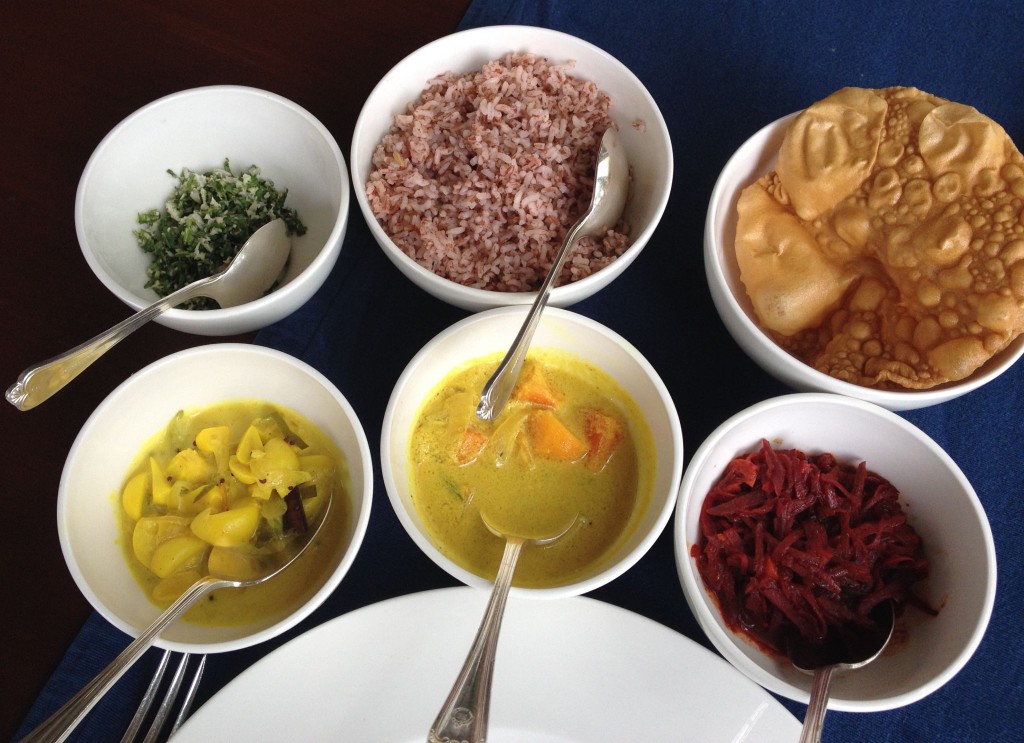Eating mindfully and healthily can be a challenge when dining out. If you eat out regularly, then reading this post is must. My simple suggestions will help you to choose your restaurant and café, and provide tips to navigate the menu to create healthy meals.
1) What are healthy meals?
Healthy meals provide a good balance of different foods. Aim to fill ¾ of your plate with plant foods and ¼ of your plate with foods providing protein from either plant or animal foods. If you eat a vegetarian diet healthy meals contain a larger serve of lentils and legumes, about a cup cooked, to ensure you get enough dietary iron.
2) Can my food be cooked in oil?
Two considerations when deciding between foods that are cook in oil are the type of oil used and the serve size of the food. When dining out, always ask what types of oils are used in cooking. This is important because oils contain different fats e.g. coconut oil and butter are mostly saturated fat, when as olive oil is mostly monounsaturated fat. Ideally we eat foods that provide a balance of all types of fat. Oils/ fats are energy dense, which means they provide a higher amount of kilojoules or calories per gram than other nutrients. Healthy meals can contain oil, but aim to eat a variety of oils and choose appropriately for your body weight and other health needs.
3) Grilled, fried or baked?
Foods that are fried contain more oil than those that are baked. Grilled foods usually contain the least amount of added fat when compared with baked or fried alternatives. An important consideration is not just the fat content, but the browning or blackening of foods. The charring of meat, such as that on barbeque meats, increases the formation of advanced glycation end products (AGEs), heterocyclic amines (HCAs) and polycyclic aromatic hydrocarbons (PAHs).
HACs and PAHs are of concern as they have been associated with the development of cancer and other chronic disesases. The good news is that the formation of these compounds is decreased by marinating meats, fish and poultry for one at least one hour prior to cooking. Marinades based on vinegar or citrus juices, with the addition of red wine, herbs and spices to boost flavour and antioxidant content are recommended. Marinated foods are a good option when dining out. By removing the blackened areas of the meats prior to eating also decreases your intake of these compounds.
4) Which cuisines provide healthy meals?
Most cuisines offer healthy meals, so you can try different cuisines when dining out. Mediterranean cuisines, such as Italian and Greek, offer a good variety of vegetables and salads, traditionally use olive oil and provide small serves of animal foods. Asian foods also provide a larger proportion of plant foods than animal foods, but some meals can be high in fat, due to the use of cooking oil in stir-fries and the addition of coconut cream and milk to curries. However Asian restaurants often offer steam vegetables, such as greens, too. Hotels and cafes offer grilled meats and steam vegetables.
5) What can I eat for dessert?
The first consideration is whether you really NEED a dessert. Perhaps if you enjoy a sweet treat, then plan to have this once a week. Sharing a dessert plate also allows you to sample different things. Asian restaurants generally provide a plate of seasonal fruit at the end of the meal, which is a great option. But if you are craving for sweet foods, I would suggest an eating and lifestyle overhaul. From an Eastern perspective craving for sweetened foods may indicate that your digestive system is sluggish. Simple healthy meals based on cooked vegetables would be recommended, and foods and drinks containing refined sugar would be removed. A strong drive to eat sugary foods may also be related to tiredness or stress.
6) How do I negotiate serve sizes?
Prior to ordering your meal, ask about the size of entrees, main meals and side dishes. This will give you a better idea of whether one main meal or two entrees would be more appropriate to satisfy your appetite. Some restaurants will allow you to order either an entrée or mail meal portion size of some meals. If you are dining out with others, then you might decide to buy a number of healthy meals to share.
7) Does it really matter what I eat when I am dining out?
The answer to this depends upon how often you eat out and your individual health needs. If you are eating outside home more than twice a week, then the nutritional quality of your meals away from home is very important. Celebrating a special occasion is different and you should enjoy foods appropriate for the occasion. If you have health requirements that are affected by what you eat e.g. diabetes, high blood pressure or coeliac disease, then inform the restaurant or café, ahead of time if possible, to ensure that suitable healthy meals are available. Most places are happy to meet your dietary needs when given enough information about your needs
Healthy meals away from home are based on the same guidelines that you would use at home to prepare your meals — nutrition, taste and enjoyment. Base your meals on plant foods, ensure you have sufficient protein and add sugar, salt and saturate fat wisely. One meal doesn’t have a huge nutritional impact, but if you are dining out several times a week then I encourage you to remain mindful of your health.
